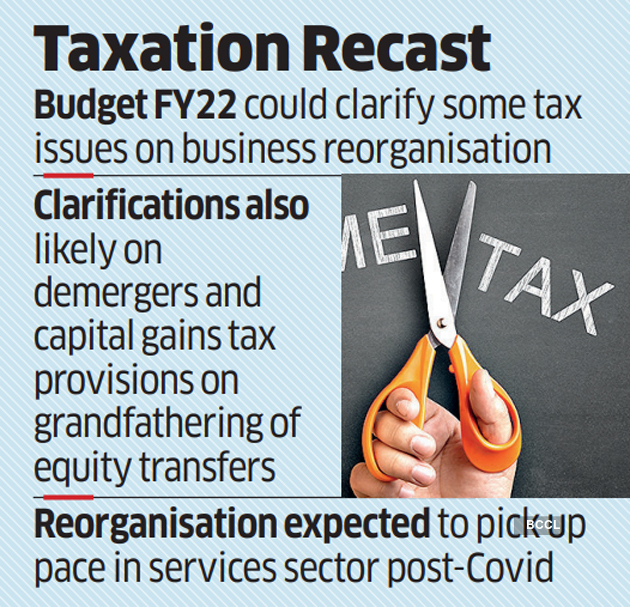The government is examining tax issues related to business reorganisation within a group as also consequent to mergers and acquisitions (M&A) as it expects such activity to increase due to the disruption and stress caused by the Covid-19 pandemic. The changes could be announced in the February 1 budget.
In particular, the government is reviewing restrictions on the carrying forward of losses in cases of change in shareholding of a closely held company as well as M&A.
The restriction on carry forward of losses to select services sectors such as banking could also be considered for relaxation.
Also under consideration are clarifications on demergers and capital gains tax provisions on grandfathering of equity transfers because of demergers or via inheritance
“There are some issues around restructuring… some could be clarified,” said a person familiar with discussions. A final call on the exact contours will be taken after examining the revenue implications of such changes, the person said.
Industry had flagged tax issues relating to reorganisation earlier in the year as the pandemic disrupted businesses and many continue to suffer.

“Post-Covid, the services sector, which still has a dominant share in India’s GDP, needs a booster as it is also the most labour intensive,” said Sudhir Kapadia, national tax leader, EY. “To encourage reorganisation and consolidation, the current benefit of business losses of the amalgamating company being utilised by the amalgamated company by industrial undertakings under Section 72A (of the Income Tax Act) should be extended to all companies in services sector like real estate, hospitality.”
Ecommerce, retail, IT and ITeS (IT-enabled services), startups and several other services sectors are left out as Section 72A specifies that only an “industrial undertaking” is eligible.
The services sector has been hit the hardest by the pandemic.
Further, under Section 79 of the Income Tax Act, a closely held company cannot set off its losses in year one against future profits, say in year five, unless shareholding to the extent of 51% remains common in years one and five. Kapadia said this works to the detriment of intra-group reorganisations where there is a nominal change in shareholding but there is none in the ultimate or overall control of the company that has incurred losses.
The Finance Act, 2018, had inserted Section 112A in the Income Tax Act, 1961, making capital gains on the sale of listed equity shares taxable. Grandfathering of the gains earned up to January 31, 2018, was allowed and no tax was to be levied on capital gains made up to that date.
However, there is lack of clarity in case a company in which shares are held on January 31, 2018, gets merged and shares of new entities are issued. Likewise with shares held prior to January 31 that are willed to a successor or gifted.
“The government should provide these clarifications that will not have any revenue implications but will provide ample relief to those impacted,” Kapadia said.
Source : Financial Express
